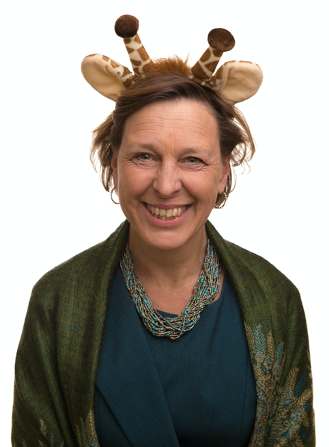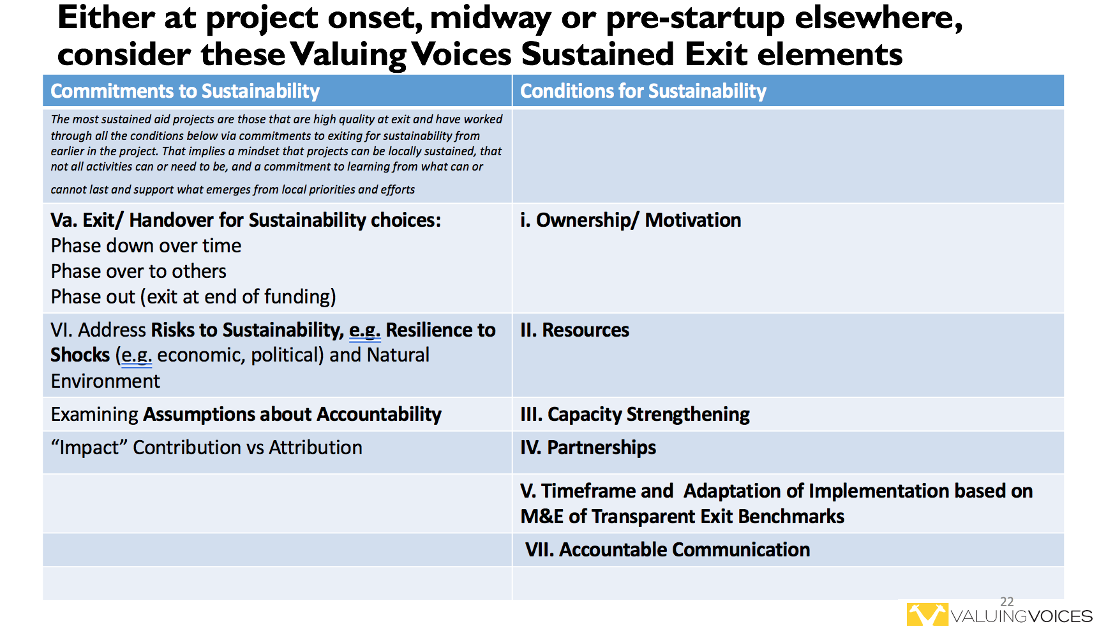
Hello. My name is Jindra Cekan, and I am the Founder and Catalyst of Valuing Voices at Cekan Consulting LLC. Our research, evaluation and advocacy network have been working on post-project (ex-post) evaluations since 2013. I have loved giraffes for decades and fund conservation efforts (see pix).
Our planet is in trouble as are millions of species, including these twiga giraffes and billions of homo-sapiens. Yet in global development we evaluate projects based on their sectoral, e.g. economic, social, educational, human rights etc., results, with barely a glance at the natural systems on which they rest. IDEAS Prague featured Andy Rowe and Michael Quinn Patton who showed that I too have been blind to this aspect of sustainability.
I have argued ad nauseum that the OECD’s definition of projected sustainability and impact don’t give a hoot about sustaining lives and livelihoods.. If we did, we would not just claim we do ‘sustainable development’ and invest in ‘Sustainable Development Goals’ but go about proving how well, for how long, by whom, after closeout.
After hearing Rowe, I added to my Sustained Exit Checklists new elements about how we must evaluate Risks to Sustainability and Resilience to Shocks that included the natural environment. I added Adaptation to Implementation based on feedback on how much implementation would need to change based in part on climatic changes.

Source: Author’s Sustained Exit training (December 2020)
Lessons Learned:
Yet new evaluation thinking by Rowe, Michael Quinn Patton, Astrid Brouselle/ Jim McDavid take us a quantum leap beyond. We must ask how can any intervention be sustained without evaluating the context in which it operates. Is it resilient to environmental threats? Can participants adapt to shocks,? Have we assessed and mitigated the environmental impacts of our interventions? As Professor Brouselle writes, “changing our way of thinking about interventions when designing and evaluating them…. away from our many exploitation systems that lead to exhaustion of resources and extermination of many species.”
This 2020 new thinking includes ascertaining:
- (Andy Rowe) Ecosystems of biotic natural capital and abiotic natural capital (from trees to minerals) with effects on health, education, public safety/ climate risk and community development
- (Michael Quinn Patton) New Evaluative Criteria including: Transformation fidelity, adaptive sustainability, eco-efficiency full-cost accounting
- (Astrid Brouselle and Jim McDavid) Human systems that affect our interventions, including: Power relations, prosperity, equity and we need to make trade-offs between environment and development goals clear.
We have miles to go of systems and values to change. Please read this and let’s start sustaining NOW.
Rad Resources:
- Rowe, A. (2019). Sustainability-read evaluation: A call to action. In G. Jules (Ed.) Evaluating Sustainability: Evaluative Support for Managing Processes in the Public Interest. New Directions for Evaluation, 162, 29-48.
- Michael Quinn Patton (2020) Evaluation Criteria for Evaluating Transformation: Implications for the Coronavirus Pandemic and the Global Climate Emergency. In the American Journal of Evaluation https://journals.sagepub.com/doi/abs/10.1177/1098214020933689
- Astrid Brouselle and Jim McDavid (2020). Evaluation for planetary health. In Evaluation: https://journals.sagepub.com/doi/abs/10.1177/1356389020952462?journalCode=evia
This week, AEA365 is celebrating Ex-post Eval Week during which blog authors share lessons from project exits and ex-post evaluations. Do you have questions, concerns, kudos, or content to extend this aea365 contribution? Please add them in the comments section for this post on the aea365 webpage so that we may enrich our community of practice. Would you like to submit an aea365 Tip? Please send a note of interest to aea365@eval.org. aea365 is sponsored by the American Evaluation Association and provides a Tip-a-Day by and for evaluators.
